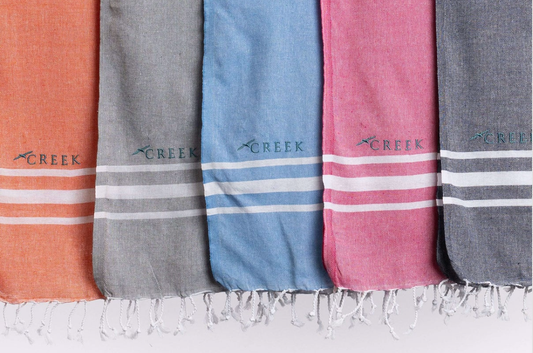Is Organic Cotton Better Than Cotton?
Quick summary: Organic cotton isn’t just another buzzword. It’s grown without synthetic pesticides or GMOs, protects soil and ecosystems and results in a fabric that’s gentle on skin. This blog shows you exactly why organic cotton is often the better choice, and what to look for to make sure you’re buying genuinely sustainable materials.
What is organic cotton?
Organic cotton comes from the same plant as regular cotton, but it's cultivated using natural methods only, no synthetic pesticides, chemical fertilisers, or genetically modified seeds. Instead, growers rely on techniques like crop rotation, composting, and natural pest control to support healthy soil and biodiversity. These methods also offer safer conditions for farm workers.
For trust and transparency, look for certification under the Global Organic Textile Standard (GOTS), which verifies organic practices from field to fibre.
Organic cotton vs conventional cotton
|
Feature |
Organic cotton |
Conventional cotton |
|
Pesticides |
Natural pest control (e.g., pyrethrin) |
Heavy use of synthetic pesticides |
|
GMO seeds |
Not allowed |
Commonly used |
|
Fertiliser |
Organic compost and green manures |
Chemical fertilisers |
|
Soil health |
Improved by crop rotation |
Often depleted |
|
Biodiversity |
Encouraged through polyculture |
Frequently compromised |
|
Farmer safety |
Reduced chemical exposure |
Significant health risks |
|
Certification |
GOTS or equivalent |
Generally uncertified |
Benefits of organic cotton
Gentler on skin
Without synthetic chemical residues, organic cotton is less likely to irritate sensitive skin, making it preferable for babies, those with eczema, and allergy-prone individuals.
Better for farmers and communities
Organic farming avoids toxic chemicals and supports fairer labour practices. It often gives growers more control over their livelihoods and health.
Lighter ecological footprint
Organic cotton farming typically uses less irrigation, farmers tend to rely more on rainfall, and results in lower carbon emissions compared to conventional methods.
Supports biodiversity and soil health
By banning GMOs and encouraging crop diversity, organic farms foster ecosystems rich in pollinators, microbes, and wildlife, important for long-term resilience.
Are there downsides?
Organic cotton isn’t perfect. It generally yields less per hectare, meaning it may require more land. Some organic-approved pesticides can still be harmful if overused, and price premiums typically make these products more costly. Still, many find the trade-offs worthwhile when aligned with values of sustainability and ethics.
How to make sure you're buying the real deal
- Look for GOTS certification (or equivalent).
- Check whether brands disclose where and how their cotton is grown, dyed, and processed.
- Avoid vague labels like “eco-friendly” without evidence.
What does this mean day to day?
If you're choosing items made of cotton, whether tees, bedding, towels, or bags, organic is a step toward more mindful living. Pieces made from certified organic cotton feel softer, last longer, and come with fewer health and environmental risks.
Why organic cotton tends to be better
- No synthetic chemicals or GMOs
- Lower water usage
- Less pollution and better soil health
- Safer working conditions for farmers
- Verified sustainability with certifications like GOTS
Trusted sources
Organic cotton isn’t about perfection. It’s about small shifts that move us closer to sustainability. Whether it’s for comfort, ethics, or environmental care, choosing organic makes a quiet but meaningful difference.
Want to try organic cotton for yourself? Browse our Shipping Forecast Collection or cosy up with our recycled cotton blankets.





